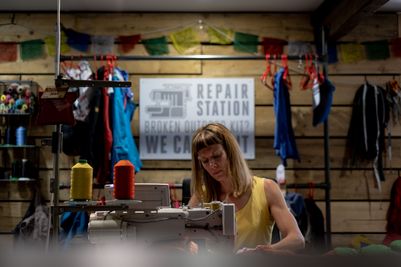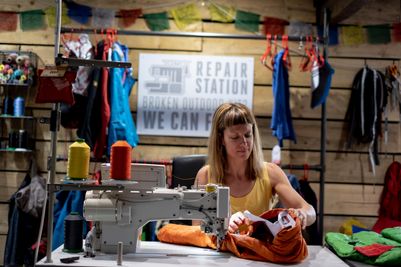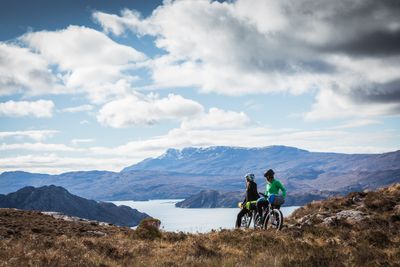9 in 10 UK outdoor enthusiasts consider sustainability in their purchase decisions
Published:
Read Time: 4 mins
UK outdoor specialist Alpkit has revealed the results of a customer survey[1] which show that 87% of outdoors enthusiasts consider the sustainability of products or companies before making a purchase. In fact, sustainability ranks higher than price and is second only to the quality of materials and construction when it comes to buying outdoors kit.
Furthermore, 90% of respondents were either very concerned or extremely concerned about the environmental impacts of the clothing industry, with 88% saying the industry needs to act now to limit harmful greenhouse gas emissions. When asked about outdoor clothing and equipment recycling, the majority of people (63%) said they donate their unwanted items to charity. Passing it onto friends, selling online and donating to a textile bank were also popular options (40%, 31% and 26% respectively). Far fewer people (14%) said they had used a retail take-back scheme, with 66% admitting they either didn’t know these existed or what they were.
These findings largely chime with those of WRAP’s ‘Citizen Insights: Textiles and Covid 19’ survey, conducted in June 2020, which show that the proportion of people concerned by the environmental impacts of clothing, and actively committed to stopping clothing waste, has risen from 31% of the population in 2017, to 50% by 2020.[2]
However, WRAP also warned that, as the UK emerged from its first lockdown, as many as 14% of people would dispose of their unwanted clothes in the general rubbish; and of those who had already cleared out their wardrobes more than one in three (36%) used the general rubbish. By comparison, only 7% of Alpkit’s customers admitted to having thrown any of their outdoors kit in the bin once it had reached the end of its useful life, further demonstrating that people who spend a lot of time in the great outdoors are more aware of their responsibility to protect the environment.
Alpkit CEO, David Hanney, commented on the survey findings: “It’s really encouraging to see that our customers have put sustainability at the heart of their purchasing decisions when it comes to buying outdoors gear. Alpkit’s love of the outdoors and the world’s wild places guides the way we do business. It's in our nature to look after what's important, whether that's the environment, animals, suppliers, staff, community or our customers.
“With the British public set to dispose of millions of clothing items as the UK comes out of its second lockdown, it’s more important than ever for retailers and organisations from across the fashion and textiles sectors to help people do this in a responsible way. We’re working hard to help create a circular retail economy, namely through our Continuum Project, and to combat the harmful environmental and social impacts of the clothing industry.”
Alpkit launched its take-back scheme, the Continuum Project, in 2017 and through this scheme the company has so far found 3 tonnes of unwanted outdoor gear a new home. Consumers can send any brand of used outdoor clothing and equipment (provided it’s in good, clean and functional condition) by dropping it off in store or using their returns process. The items are then either donated directly to those who need it most through one of their charity partners or to upcycling projects. The rest gets recycled. Absolutely nothing ends up in landfill.
Their design ethos is set in stone: to make Gear You Love For Longer, the gear you use year after year and form a lifelong relationship with.
Alpkit became a certified B Corp in September 2020. B Corp assesses and audits companies against rigorous standards of social and environmental performance, accountability and transparency. Alpkit were certified at the first attempt with a score of 95 which places them firmly in the leading pack of the UK’s highest ranking sustainable businesses.
Last year Alpkit also became the first UK outdoor brand to publish a comprehensive Sustainability Report.
In 2020 they demonstrated how they put people and planet before profit by:
· pivoting Alpkit Foundation to direct support towards food projects in lockdown. Alpkit Foundation has now awarded £300,000 to 900 projects involving over 15,000 people.
· increasing pay rates for all employees, in the midst of lockdown, and becoming formally recognised as a Living Wage Foundation employer
· reducing their carbon intensity and offsetting Scope 1 and 2 to net zero greenhouse gases.
In 2021 they will:
· catch up, when travel is permitted, on their programme of personal environmental reviews at their mills and factories, including deeper lifecycle analysis
· restart their School of Adventure events programme for a more accessible and inclusive outdoors with a range of open courses to build outdoor skills and confidence
· relaunch their team adventure training and face-to-face training programmes to develop career skills and opportunities at Alpkit.
[1] Survey conducted among Alpkit UK customers in April 2021, with 2,604 responses received.
[2] https://wrap.org.uk/media-centre/press-releases/67-million-items-clothing-could-be-discarded-uk-homes-post-lockdown
Ends
Editors notes
Alpkit was started in 2004, founded on the belief that it’s possible to make gear that works harder and costs less. It’s the only UK brand to sell equipment for running, hiking, climbing, camping, swimming and biking.
Alpkit makes products in the UK in its own factory in Nottingham. There are six Alpkit stores in Hathersage, Ambleside, Keswick, Metrocentre, Betws y Coed and Edinburgh. The website has won “Best Online Retailer” as voted by the readers of TGO magazine for six out of the last seven years.
Alpkit puts on events – all stores host talks, rides and runs and every year Alpkit puts on the Big Shakeout, where 1000 people gather together for a weekend of adventure and entertainment.
1% of all sales goes to Alpkit Foundation, Alpkit’s independent charity set up to remove barriers to getting outdoors and experiencing wild places.



